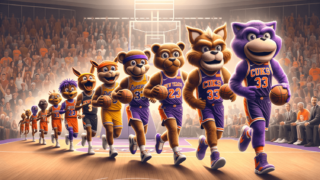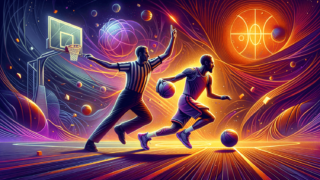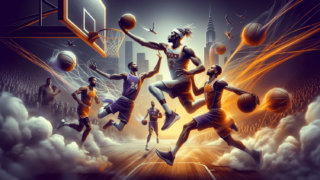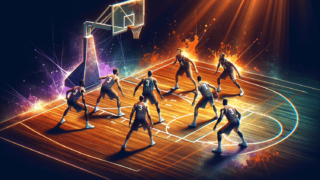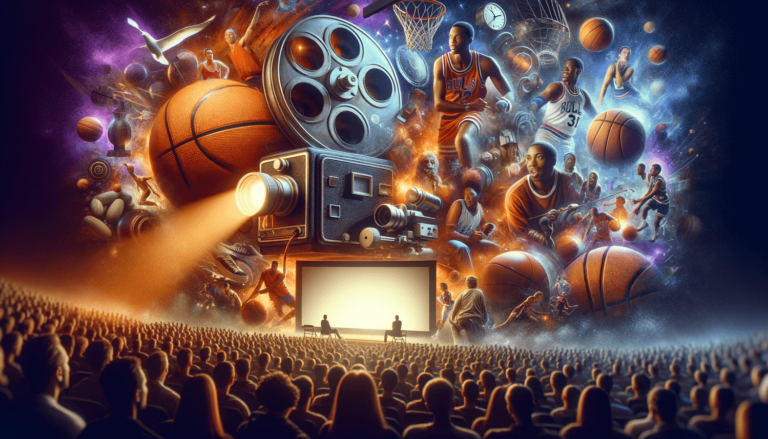
Role of Basketball Movies in Pop Culture
Written by: Basketball Universe
Last updated:

From nail-biting buzzer-beaters to heartwarming underdog stories, basketball movies have long captured the imaginations of moviegoers and sports enthusiasts alike. With a perfect blend of thrilling action and inspiring characters, these films have cemented their place in pop culture and left an indelible mark on the hearts of many. In this blog post, we’re going to dive into the inescapable role of basketball movies in pop culture, exploring how these silver screen slam dunks have shaped our perceptions of the game and influenced our understanding of teamwork, perseverance, and triumph both on and off the court. So lace up your sneakers, grab your popcorn, and let’s shoot some hoops as we delve into the fascinating world of basketball cinema!
Role of Basketball Movies in Pop Culture
Basketball movies play a significant role in pop culture as they not only entertain wide audiences but also inspire and educate about the sport’s values of teamwork, perseverance, and triumph. These films often serve as a reflection of society, showcasing relatable stories and diverse characters, all while highlighting the excitement and challenges of the game. By tapping into the universal love for basketball and the human spirit, they solidify their cultural status and impact countless fans’ lives for years to come.
From Screen to Court: The Impact of Basketball Movies
Basketball movies have long been a staple of the sports film genre, captivating audiences with their compelling stories, dynamic characters, and emphasis on the importance of teamwork and grit. Through their gripping depictions of the highs and lows of the game, these films have left an indelible mark on millions of fans. This blog post explores how basketball movies have shaped our understanding of the sport, both on and off the court.
Hoops on the Silver Screen: Moments That Defined Basketball History
Throughout cinema history, basketball movies have provided fans with countless unforgettable moments that have both reinforced and challenged our preconceptions about the sport. By taking a closer look at some of the most iconic basketball movies, fans can gain a deeper appreciation of how these films have influenced not only the way we watch and play the game, but also the broader cultural context in which they were created.
The Breakthrough: “Hoosiers” (1986)
One of the first basketball movies to leave a lasting impression on pop culture was the 1986 film “Hoosiers,” which chronicles the story of a small-town Indiana high school team defying the odds to win the state championship. Based on the true story of the 1954 Milan High School team, “Hoosiers” introduced audiences to unforgettable characters such as the troubled star player Jimmy Chitwood and the redemption-seeking Coach Norman Dale (played by Gene Hackman). The film’s heartwarming narrative and realistic portrayal of basketball proved to be a winning formula, inspiring generations of fans and aspiring athletes to believe in the power of teamwork and perseverance.
From Underdogs to Champions: “White Men Can’t Jump” (1992), “Blue Chips” (1994), and “Coach Carter” (2005)
Basketball movies often center around the concept of the underdog team or player surmounting monumental odds to achieve greatness. “White Men Can’t Jump” (1992) explores the unlikely partnership between two streetball players, played by Wesley Snipes and Woody Harrelson, whose differences in race, culture, and playing style force them to confront stereotypes and forge a connection that transcends the game. “Blue Chips” (1994), starring Nick Nolte and Shaquille O’Neal, delves into the world of college recruiting and highlights the pressures and temptations faced by amateur athletes. “Coach Carter” (2005) recounts the true story of a heroic high school basketball coach (played by Samuel L. Jackson) who chooses to bench his talented but academically underperforming team to instill discipline, education, and a sense of responsibility in his players. These films not only capture the spirit of competition and overcoming adversity but also address broader social issues and offer life lessons beyond the court.
From Fiction to Reality: “Space Jam” (1996) and “Space Jam: A New Legacy” (2021)
When it comes to basketball movies that have left an unforgettable mark on pop culture, few can compete with the phenomenon that was “Space Jam” (1996). Featuring NBA superstar Michael Jordan and beloved Looney Tunes characters, the movie brilliantly blended live-action and animation, providing a fantastical and entertaining backdrop for a unique basketball adventure. The film’s success not only elevated basketball’s status in pop culture but also introduced a new generation of fans to the sport. A testament to its enduring impact, “Space Jam” inspired a 2021 sequel, “Space Jam: A New Legacy,” which stars LeBron James and takes the adventures to new, innovative dimensions while celebrating and honoring the game’s rich history and legends.
Basketball Movies and the Power of Representation
One of the key reasons basketball movies resonate so deeply with audiences is their ability to represent diverse individuals from various walks of life. By showcasing the stories and struggles of players, coaches, and communities in a relatable and empathetic manner, these films not only entertain but also serve as powerful catalysts for change and understanding.
Women in Basketball: “Love & Basketball” (2000) and “The Winning Season” (2009)
The portrayal of women in basketball films provides an essential platform for highlighting the unique challenges and experiences faced by female athletes. “Love & Basketball” (2000) is a groundbreaking film that chronicles the journey of two childhood friends turned lovers, Monica (Sanaa Lathan) and Quincy (Omar Epps), as they navigate the complexities of professional basketball careers and personal relationships. The film uncovers the struggles faced by female athletes on and off the court, including gender-based stereotypes and balancing family life with athletic ambitions. Similarly, “The Winning Season” (2009) explores the challenges faced by a misfit high school girls’ basketball team and their unconventional coach (Sam Rockwell) as they tackle their own insecurities and societal expectations.
Celebrating Cultural Diversity: “He Got Game” (1998) and “Glory Road” (2006)
Basketball films serve to showcase the cultural diversity inherent in the sport and the ways it reflects and influences society. Spike Lee’s “He Got Game” (1998), starring Denzel Washington and Ray Allen, examines the intersection of basketball, family dynamics, and urban life as it depicts the struggles of a young phenom navigating the pressures of college recruitment and family expectations. Another notable film, “Glory Road” (2006), highlights the incredible true story of the 1966 Texas Western College basketball team as they overcome racial adversity and discrimination while breaking barriers for African American athletes.
Leave It All on the Court: Life Lessons from Basketball Movies
Apart from their impact on pop culture, basketball movies often impart crucial life lessons that can be applied off the court, inspiring and motivating fans to strive for success in their own lives.
Dealing with Adversity: “Rudy” (1993) and “The Way Back” (2020)
While not solely focused on basketball, “Rudy” (1993) is a classic sports film that teaches the value of perseverance and determination. The true story of an undersized and under-talented football player (Sean Astin) who overcomes numerous obstacles to achieve his dream of playing at the University of Notre Dame has resonated with fans worldwide. In a similar vein, “The Way Back” (2020), starring Ben Affleck as an alcoholic high school basketball coach seeking redemption, sheds light on the importance of confronting personal demons and finding strength in vulnerability.
Teamwork Makes the Dream Work: “Miracle” (2004) and “Remember the Titans” (2000)
Although they center around different sports, “Miracle” (2004) and “Remember the Titans” (2000) both showcase the importance of teamwork and unity in achieving greatness. “Miracle” tells the incredible story of the 1980 U.S. Olympic hockey team and their underdog victory over the Soviet Union, while “Remember the Titans” portrays a racially diverse high school football team coming together under the guidance of Coach Herman Boone (Denzel Washington) during the turbulent era of racial integration in 1970s America. These films serve as a reminder that success, both on and off the court, is best achieved through collective efforts and overcoming personal biases.
Final Buzzer: The Everlasting Influence of Basketball Movies in Pop Culture
Throughout the history of cinema, basketball movies have not only entertained and inspired fans but also played a vital role in shaping the way we view and experience the game. With their compelling narratives, unforgettable characters, and thought-provoking themes, these films have left an enduring impact on popular culture and will undoubtedly continue to do so for generations to come.
The Contribution of Real-Life Athletes to Basketball Movies
In many basketball movies, real-life athletes have appeared on screen, often playing themselves or fictional characters. These athletes bring a heightened authenticity to basketball movie projects and generate further excitement among fans. By taking on these roles, the athletes blur the lines between sports and cinema, enhancing the impact of basketball movies in pop culture.
Ray Allen in “He Got Game” (1998)
The previously mentioned Spike Lee film, “He Got Game” (1998), stars then-NBA player Ray Allen, who gives a highly praised performance as the highly recruited high school player Jesus Shuttlesworth. Ray Allen’s real-world skills on the court and genuine understanding of the pressures associated with college recruitment contribute to the film’s sense of authenticity, adding an additional layer of depth to the story.
Shaquille O’Neal in “Blue Chips” (1994) and “Kazaam” (1996)
NBA legend Shaquille O’Neal has made numerous appearances in basketball movies, such as “Blue Chips” (1994) and “Kazaam” (1996). In “Blue Chips,” O’Neal plays a college basketball player who faces moral dilemmas surrounding the world of sports recruiting, while in “Kazaam,” he brings a lighthearted and entertaining touch to the role of a wish-granting genie with a passion for basketball. O’Neal’s involvement in these films not only adds star power but also creates a connection between the audiences and the unique experiences of professional athletes.
Michael Jordan in “Space Jam” (1996) and other NBA Cameos
As the centerpiece of the pop culture phenomenon “Space Jam” (1996), Michael Jordan’s starring role cements the relevance of basketball movies to both sports and cinema. His appeal as a global superstar amplified the film’s success, which fueled further interest in basketball among fans and paved the way for other athletes to make their mark on the big screen. Additionally, numerous NBA players provide cameos throughout basketball movies, serving as a testament to their commitment to promoting the sport and connecting with fans through unique storytelling experiences.
Inspiration on the Court: How Basketball Movies Influence Real-Life Players and Teams
As more than just a form of entertainment, basketball movies often inspire real-life players and teams to emulate the qualities of discipline, teamwork, and hard work displayed on screen. These films can provide invaluable motivation and a blueprint for success that hundreds of athletes have adopted over the years.
Motivating Pre-Game Rituals
Many players, teams, and coaches have adopted the pre-game ritual of watching their favorite basketball movies to boost morale and prepare for the challenges that lie ahead. The inspirational stories portrayed in these films are often seen as powerful tools for instilling a winning mindset in athletes and creating unbreakable team bonds.
Notable Examples of On-Court Inspiration
Numerous real-life athletes have credited basketball movies for motivating them in their quests for success. Such examples include NBA star Stephen Curry using the persistence and focus of Jesus Shuttlesworth from “He Got Game” as inspiration or LeBron James carrying the brotherhood principles from “Coach Carter” into his own career. These athletes’ mentions of basketball movies only serve to further underscore the powerful impact that these films have on their lives, both on and off the court.
Basketball in Pop Culture: Beyond the Movies
While basketball movies have undoubtedly played a significant role in popularizing the sport, they are not the only medium through which basketball has permeated popular culture. The influence of the game can be found in various other aspects of our daily lives, ranging from music and fashion to video games and literature.
Basketball in Music and Fashion
There is a long history of collaboration between basketball and the music industry, especially in hip-hop culture. Iconic musicians such as Jay-Z, Drake, and Kanye West have been known to incorporate basketball references in their lyrics, attend games, or even own interests in NBA teams. Similarly, basketball and streetwear fashion have become heavily intertwined, with athletes like Michael Jordan and LeBron James launching successful shoe lines with brands like Nike, or trendsetters like Russell Westbrook making a name for themselves in the world of fashion.
Basketball Video Games and Literature
Popular video game franchises, such as “NBA 2K” and “NBA Live,” have paved the way for fans to experience the thrill of playing as their favorite athletes and immerse themselves in the world of competitive basketball
FAQ: All Your Basketball Movie Questions Answered
Here are some frequently asked questions (FAQ) about basketball movies and their role in pop culture. Explore insights into the impact of basketball movies on fans, athletes, and society, as well as their long-lasting influence on film, sports and beyond. Feel free to use these answers to enhance your knowledge or initiate an engaging conversation about the power of basketball movies.
1. Why are basketball movies so popular among fans and non-fans alike?
Basketball movies are popular because they often combine the excitement of the game with engaging storylines, relatable characters, and compelling themes that explore personal growth, teamwork, and overcoming adversity. The universality of these narratives allows both fans and non-fans to connect with the films on an emotional level, resulting in a broad appeal for these movies.
2. How have basketball movies influenced the way people perceive the sport?
Basketball movies provide a platform for showcasing the sport’s core values, such as teamwork, dedication, and perseverance. Through their characters and storylines, these films offer valuable life lessons that resonate with audiences beyond the basketball court. As a result, basketball movies have shaped perceptions of the sport and its athletes, inspiring countless fans and players to adopt these values in their own lives.
3. What impact do basketball movies have on pop culture?
Basketball movies impact pop culture by connecting sports with storytelling, music, fashion, and other aspects of popular culture. These entertaining and inspiring films offer relatable experiences for diverse audiences and serve as a catalyst for conversations, trends, and even societal change. The enduring popularity of basketball movies has resulted in an increased interest in the sport, transforming it into a celebrated and influential aspect of pop culture.
4. How do basketball movies inspire real-life players and teams?
Basketball movies often provide motivation and inspiration to players and teams by showcasing uplifting stories of players and coaches overcoming the odds, demonstrating resilience, and embracing teamwork. The powerful narratives and characters found in these films can be used as a blueprint for success, fostering a winning mindset in real-life athletes that carries over onto the court.
5. What elements contribute to the success of a basketball movie?
Successful basketball movies typically contain a combination of relatable and engaging characters, believable on-court action, and powerful themes that resonate with audiences. In addition, these films may feature real-life athletes, accurate representation of the sport’s passion and intensity, and socio-cultural relevance that speaks to broader societal issues. They also often leave a lasting impact on viewers, inspiring new generations to engage with the sport.
6. How do basketball movies address social issues and promote change?
Basketball movies impart valuable life lessons, often transcending the sport itself to tackle broader social and cultural issues, such as racial disparities, gender bias, and socioeconomic challenges. By presenting these issues in a relatable and empathetic manner, basketball movies foster understanding and promote change among viewers, positively impacting society in significant ways.
7. Which basketball movies are considered “must-watch” classics?
Some “must-watch” basketball movies include “Hoosiers” (1986), “White Men Can’t Jump” (1992), “He Got Game” (1998), “Blue Chips” (1994), “Space Jam” (1996), “Coach Carter” (2005), “Love & Basketball” (2000), and “Glory Road” (2006). These films are celebrated for their engaging stories, memorable characters, and reflections of broader cultural themes and values.
8. Can basketball movies appeal to those who are not fans of the sport?
Absolutely! Basketball movies often delve into themes and experiences that extend beyond the sport itself, including personal growth, team dynamics, and overcoming obstacles. These universal narratives allow viewers who may not be fans of basketball to connect with the characters and the larger themes of these films, making them accessible and enjoyable for a wide range of audiences.
9. How do basketball movies portray the experiences of female athletes?
Basketball movies such as “Love & Basketball” (2000) and “The Winning Season” (2009) depict the unique challenges, struggles, and triumphs experienced by female athletes in the world of sports. These films address a range of issues, including gender stereotypes, balancing personal relationships with athletic ambitions, and societal expectations, thereby providing valuable representation and visibility for aspiring female players.
10. Are there any basketball documentaries that offer a similar impact on pop culture as basketball movies?
Featured Posts
- No pillar pages found.
